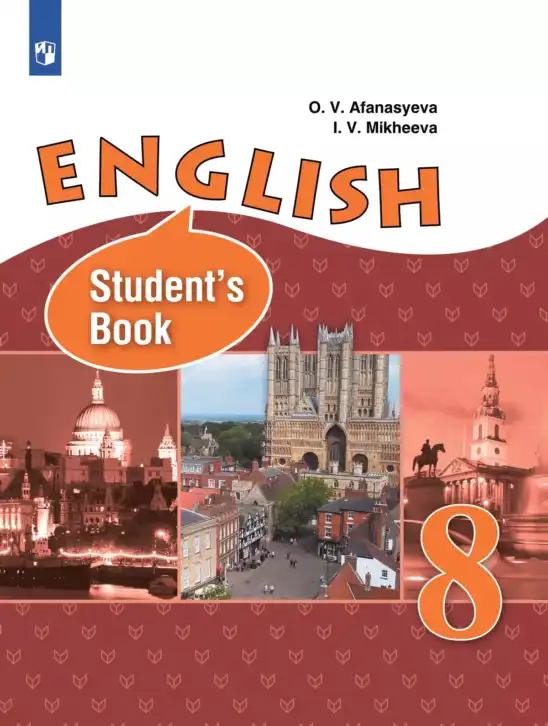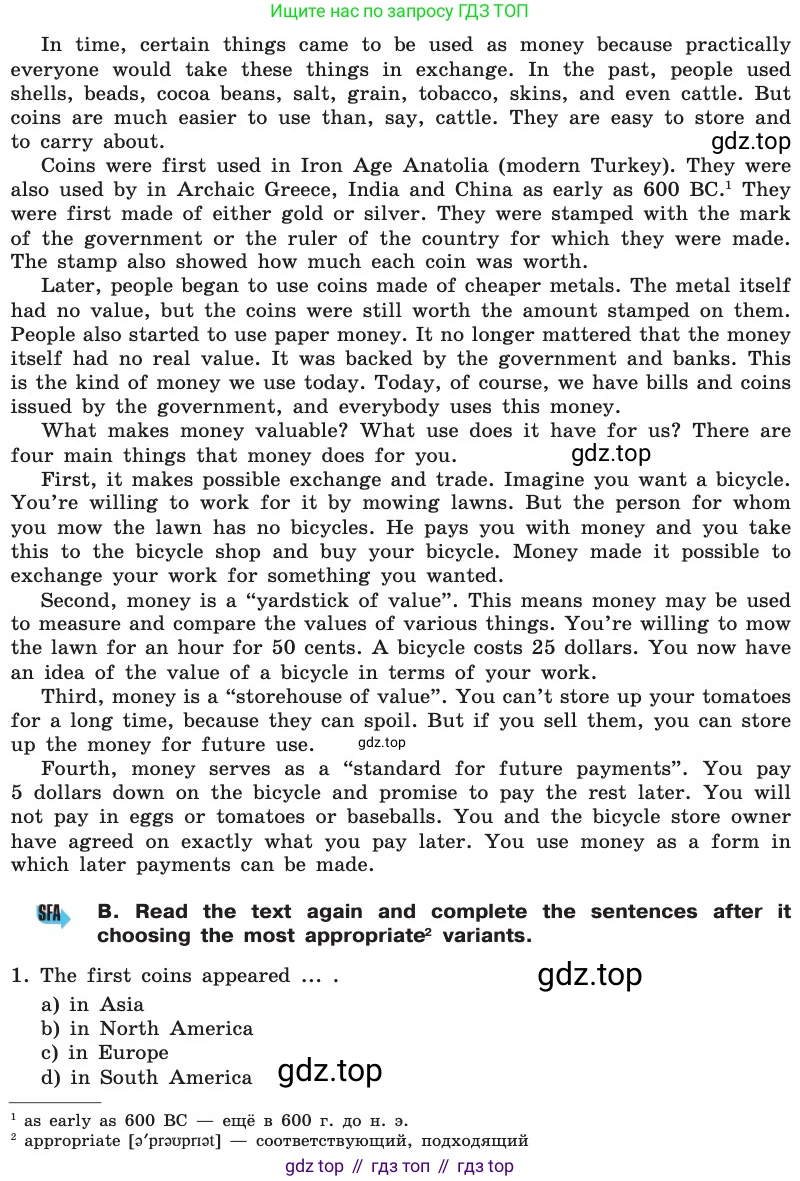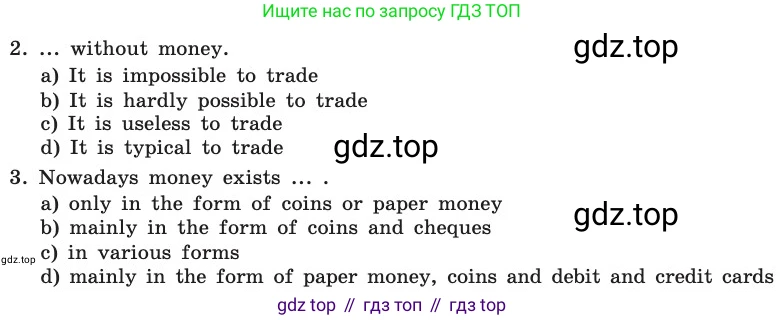Номер 21, страница 93 - гдз по английскому языку 8 класс учебник Афанасьева, Михеева

Авторы: Афанасьева О. В., Михеева И. В.
Тип: Учебник
Издательство: Просвещение
Год издания: 2014 - 2025
Уровень обучения: углублённый
Цвет обложки: белый
ISBN: 978-5-09-034201-8
Допущено Министерством просвещения Российской Федерации
Популярные ГДЗ в 8 классе
Unit 3. Shopping: The World of Money. Reading for Information: «What Makes Money Valuable?» - номер 21, страница 93.
№21 (с. 93)
Условие. №21 (с. 93)
скриншот условия



READING FOR INFORMATION
21 A. Read the text about money once and say what things make money valuable.
What Makes Money Valuable?
We use money every day to pay for things we buy. We pay with either coins or paper money. This sort of money is known as cash. There is also another kind of money. It includes debit and credit cards and electronic (online) wallets.
The idea of having such a thing as money is one of the most fascinating ever developed by Man. But many people don't know where this idea came from, or why money is valuable.
Thousands of years ago, money was not used. Instead, Man had the barter system. This meant that if a man wanted something he didn't have, he had to find someone who had it. Then he had to offer him something in exchange. And if that man didn't like what he was offered in exchange, the first man couldn't get what he needed.
In time, certain things came to be used as money because practically everyone would take these things in exchange. In the past, people used shells, beads, cocoa beans, salt, grain, tobacco, skins, and even cattle. But coins are much easier to use than, say, cattle. They are easy to store and to carry about.
Coins were first used in Iron Age Anatolia (modern Turkey). They were also used by in Archaic Greece, India and China as early as 600 BC1. They were first made of either gold or silver. They were stamped with the mark of the government or the ruler of the country for which they were made. The stamp also showed how much each coin was worth.
Later, people began to use coins made of cheaper metals. The metal itself had no value, but the coins were still worth the amount stamped on them. People also started to use paper money. It no longer mattered that the money itself had no real value. It was backed by the government and banks. This is the kind of money we use today. Today, of course, we have bills and coins issued by the government, and everybody uses this money.
What makes money valuable? What use does it have for us? There are four main things that money does for you.
First, it makes possible exchange and trade. Imagine you want a bicycle. You're willing to work for it by mowing lawns. But the person for whom you mow the lawn has no bicycles. He pays you with money and you take this to the bicycle shop and buy your bicycle. Money made it possible to exchange your work for something you wanted.
Second, money is a "yardstick of value". This means money may be used to measure and compare the values of various things. You're willing to mow the lawn for an hour for 50 cents. A bicycle costs 25 dollars. You now have an idea of the value of a bicycle in terms of your work.
Third, money is a "storehouse of value". You can't store up your tomatoes for a long time, because they can spoil. But if you sell them, you can store up the money for future use.
Fourth, money serves as a "standard for future payments". You pay 5 dollars down on the bicycle and promise to pay the rest later. You will not pay in eggs or tomatoes or baseballs. You and the bicycle store owner have agreed on exactly what you pay later. You use money as a form in which later payments can be made.
B. Read the text again and complete the sentences after it choosing the most appropriate2 variants.
1. The first coins appeared . . . .
a) in Asia
b) in North America
c) in Europe
d) in South America
1 as early as 600 BC — ещё в 600 г. до н. э.
2 appropriate [əˈprəʊpriət] — соответствующий, подходящий
2. . . . without money.
a) It is impossible to trade
b) It is hardly possible to trade
c) It is useless to trade
d) It is typical to trade
3. Nowadays money exists . . . .
a) only in the form of coins or paper money
b) mainly in the form of coins and cheques
c) in various forms
d) mainly in the form of paper money, coins and debit and credit cards
Решение. №21 (с. 93)


Решение 2. №21 (с. 93)
B. Прочитайте текст еще раз и дополните предложения, выбрав наиболее подходящие варианты.
Ответ:
1. The first coins appeared a) in Asia.
Первые монеты появились а) в Азии.
2. b) It is hardly possible to trade without money.
б) Почти невозможно торговать без денег.
3. Nowadays money exists c) in various forms.
В настоящее время деньги существуют в) в различных формах.
Другие задания:
Помогло решение? Оставьте отзыв в комментариях ниже.
Присоединяйтесь к Телеграм-группе @top_gdz
ПрисоединитьсяМы подготовили для вас ответ c подробным объяснением домашего задания по английскому языку за 8 класс, для упражнения номер 21 расположенного на странице 93 к учебнику 2014 года издания для учащихся школ и гимназий.
Теперь на нашем сайте ГДЗ.ТОП вы всегда легко и бесплатно найдёте условие с правильным ответом на вопрос «Как решить ДЗ» и «Как сделать» задание по английскому языку к упражнению №21 (с. 93), авторов: Афанасьева (Ольга Васильевна), Михеева (Ирина Владимировна), углублённый уровень обучения учебного пособия издательства Просвещение.
















